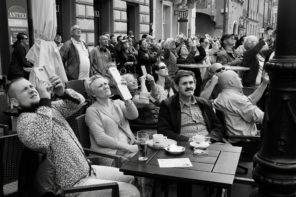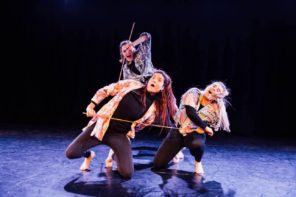Last week I did my first live theatre R&D since the beginning of the pandemic. Once we had been tested, temperature-checked and thoroughly alcogelled, me and seven other performers had special permission to work together indoors and even take off our masks whilst rehearsing. Needless to say at this point, it was a highly emotional experience to feel ”normal” again for a few days. After these seemingly endless months of working mostly alone at home it showed how much is lost when we are separated from each other. For over a year now we have had to avoid each other, supress our spontaneity and stay in the same space. As a live artist and a teacher, it meant that almost every single aspect of my craft; physical expression, connection, travel, liveness, had to be put aside. As our world is now starting to slowly open again while we learn to live with this new situation, I think it is so important that we reconnect with all these most beautiful aspects of humanity.
I firmly believe that creativity is a universal human ability that has little to do with conservatoires and institutions. Since the cave paintings, we humans have had an inherent need to tell our stories through music, dance, theatre, art and eventually, literature. The Ancient Greeks did it, the Romans did it, and even alongside the darkness of the Medieval plague theatre was performed, stories were told and songs were sung. It seems that even in the face of the most difficult challenges creative expression allows us to connect and process the human condition in a holistic way.
I often hear people say “I don’t have any artistic talent” and I always think they are wrong. Having worked a lot with young children I have seen creativity and play in its rawest form. It is when we grow up that we are lead to believe that unless we are professionals on the West End with a license to sing, dance and act, play as such is no longer something we do. Children play. Adults are serious. As if play wasn’t serious. It is through play that children process and learn about the world around them. Often, in treating children who have experienced severe trauma play is a central part of the healing process. Play is a safe space where we can step outside of ourselves, look at our experiences and go “huh?”. More importantly, it is a space where we can look at our individual experiences together.
In many indigenous culture, play, dance, storytelling and music is very much something people of all ages engage with. It is a way to share experiences, connect, have fun and perform rituals. Scientific studies exploring the role of performing arts in the wider community show that play and creative engagement have endless benefits. We know that engaging with the arts can help ease pain in cancer patients, slow the progression of dementia, heal trauma and bring communities together. As far as I’m concerned that is as good as magic.
Furthermore, creativity is behind humanity’s greatest achievements. You may not perceive at first glance any similarities between the highly advanced mathematical calculations currently allowing us to communicate with a robot on Mars and, for instance, the process of writing a song. However, as Einstein said ”Creativity is intelligence having fun”. Scientists within various fields know that creativity is a huge part of making new discoveries. When we use our bodies and minds freely to think ”outside of the box” the sky seems to be the limit, or more accurately, Mars seems to be the limit. For the moment. As we are facing big challenges in the world our ability to think creatively and put our brains together to find solutions, is more important than ever.
As we are returning to, perhaps not normal but a new normal, let’s find space to play and connect, turning our challenges into art and sharing our unique stories.







